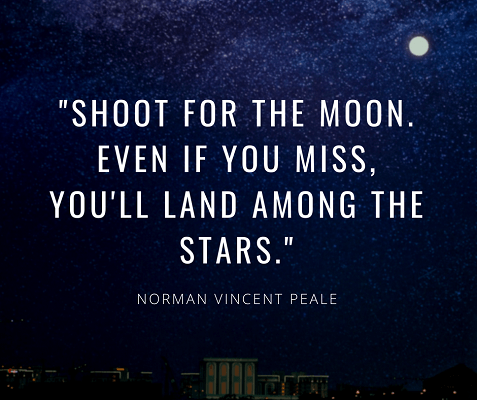
YouTube / iTunes / Spotify / Radio Public / Pocket Casts / Google Podcasts / Breaker / Overcast
Listen to ArtisanEnglish.jp posts & lesson intros here.
Idiom: Shoot for the moon
I’ve heard that Japanese millennials don’t shoot for the moon because they don’t have the ambitions of previous generations.
It seems to be true, but I can’t say for sure.
The Heisei era will be ending next year.
Children born in the early Heisei era are only in their mid to late 20s now.
There’s still lots of time for them to make their mark on this world.
One of the difficulties is that young Japanese people today were born after the Japanese economic boom.
They haven’t grown up in deprivation and poverty but have lived their entire lives in stasis or unchanging circumstances.
This is where the expression that I’ve chosen for today comes in.
Shoot for the moon is part of a quote from Norman Vincent Peale.
Mr. Peale was an author and also a minister.
He is the man who popularized the theory of positive thinking.
He is most famous as the author of The Power of Positive Thinking.
The full quote is, “Shoot for the moon, and even if you miss, you’ll land among the stars.”
Think about it for a second or two.
It’s an incredibly positive expression.
It means that if we set our ambitions high, even if we cannot attain those dreams, we will still be more successful than if we never tried at all.
You can’t lose as long as you work to achieve lofty goals.
Even though the Heisei era is ending, we are just at the beginning of the fourth industrial revolution.
Artificial Intelligence and innovative, renewable forms of energy will lead the way into a fresh and bright future.
All the Heisei kids out there would do well to remember the words of Mr. Peale:
“Shoot for the moon, and even if you miss, you’ll land among the stars.”
Flesch-Kincaid Readability Test
This post is understandable by someone with at least a 7th-grade education (age 12).
On the Flesch-Kincaid reading-ease test, this post scores 73.
The easier a passage is to read, the higher the score on a scale of 0 – 100.

